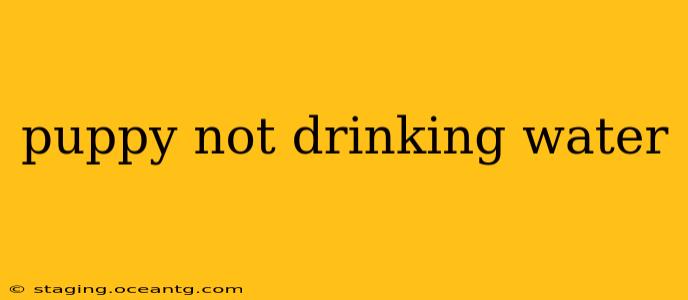Is your puppy refusing to drink water? This is a serious concern that requires immediate attention. Dehydration in puppies can quickly become life-threatening. This guide will explore the reasons why your puppy might be avoiding water, and what you can do to encourage hydration and ensure their health.
Why Isn't My Puppy Drinking Water?
There are numerous reasons why a puppy might not be drinking enough water. Let's explore some of the most common causes:
Is My Puppy Dehydrated?
This is the first and most crucial question. Signs of dehydration include:
- Sunken eyes: A clear indication of fluid loss.
- Dry gums: Gums should be moist and pink. Dry, sticky gums are a warning sign.
- Lethargy: A dehydrated puppy will appear tired and less active.
- Loss of skin elasticity: Pinch the skin on the back of your puppy's neck; it should snap back quickly. Slow return indicates dehydration.
If you suspect dehydration, seek veterinary attention immediately. This is not a condition to treat at home.
Is the Water Bowl Location Inconvenient?
Puppies, especially young ones, may not be able to easily access their water bowl. Consider these factors:
- Location: Is the bowl placed in a high-traffic area where they might be disturbed while drinking? Try placing it in a quieter corner.
- Accessibility: Is the bowl too shallow or too deep for your puppy? They might struggle to reach the water.
- Cleanliness: Make sure the bowl is spotless. Puppies are sensitive to smells and won't drink from a dirty bowl.
Does My Puppy Have a Medical Condition?
Several medical conditions can lead to decreased water intake:
- Parvovirus: This highly contagious virus causes severe vomiting and diarrhea, leading to rapid dehydration.
- Kennel Cough: While not directly related to dehydration, the coughing and discomfort can make drinking difficult.
- Kidney disease: Kidney problems can affect the body's ability to regulate fluid balance.
- Dental problems: Painful teeth or gums can make drinking uncomfortable.
- Gastrointestinal issues: Vomiting, diarrhea, or upset stomachs can decrease thirst.
Any of these conditions require veterinary care. Don't attempt to diagnose or treat your puppy yourself.
Could My Puppy's Food Be Contributing?
The type of food your puppy eats can also influence their water intake:
- Dry kibble: Dry food requires more water for digestion. If you feed dry kibble, ensure your puppy has consistent access to fresh water.
- Wet food: Wet food provides more moisture, potentially reducing the need for additional water.
What If My Puppy is Drinking Less Water After a Vaccine?
It's not uncommon for puppies to experience temporary lethargy and decreased appetite, including reduced water intake, after vaccinations. This is usually mild and resolves within a day or two. However, if you're concerned, contact your veterinarian.
How Can I Encourage My Puppy to Drink More Water?
Here are some tips to encourage your puppy to drink more water:
- Offer fresh water frequently: Change the water regularly throughout the day.
- Try different bowls: Experiment with different types of bowls—stainless steel, ceramic, or even a fountain.
- Add flavor: A tiny amount of low-sodium chicken broth can make the water more appealing (avoid adding salt). Never add anything without consulting your veterinarian.
- Ice cubes: Ice cubes can be a fun and refreshing alternative, especially during warmer weather.
- Water alongside food: Place the water bowl near the food bowl to encourage drinking during mealtimes.
When to Seek Veterinary Care
If your puppy shows signs of dehydration, exhibits any other concerning symptoms, or their water intake remains consistently low, schedule an appointment with your veterinarian immediately. Early intervention is crucial for preventing serious health complications.
Remember, this information is for general guidance only and does not replace professional veterinary advice. Always consult your veterinarian for any concerns about your puppy's health.
